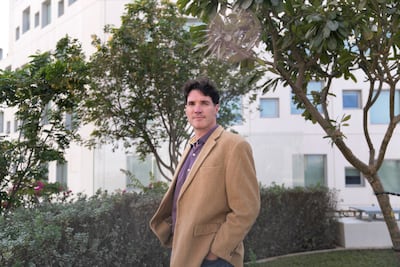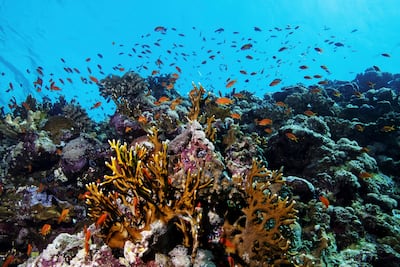The waters off the UAE coast were the hottest since records began, with temperatures exceeding 38°C even at depths of six metres, according to researchers.
The increase of 2°C above the average in the Gulf came amid the absence of strong shamal winds.
These seasonal, north-westerly winds generally occur during the summer, but climate change has affected normal weather patterns.
Experts said the record temperatures led to unprecedented and extensive bleaching of reefs in the region.
New York University Abu Dhabi
The phenomenon occurs when corals expel algae living inside them because they are stressed.
“Unfortunately the marine heatwave this year was so extensive that it bleached corals from Kuwait all the way across Iran, through the UAE and out on to the east coast going all the way down to Muscat,” said John Burt, associate professor of biology at New York University Abu Dhabi, who has studied the region’s seas for the past 15 years.
“This bleaching event was region-wide and has caused, particularly in the east coast, very extensive areas of mortality.
“We don’t have the data analysed yet, but we see this as a catastrophic event.”
Temperature recordings for this study were taken in the waters off the UAE coast but the findings will be of concern to all of the Gulf nations.
Disastrous marine heatwaves

The Gulf is home to the world’s most thermally tolerant corals, which regularly withstand temperatures that exceed 36°C in the summer.
But because they are living at the edge of their endurance, any rise in temperature such as that seen this summer can be devastating, said Mr Burt, who acted as a contributor to a global report which has just been released.
The study confirmed the world has lost 14 per cent of its coral reefs since 2009, largely due to the effects of climate change.
Mass bleaching events were mainly to blame, with an event in 1998 alone leading to the loss of 8 per cent of coral reefs globally.
After that event, many reefs recovered. But marine heatwaves have become more regular since then, and are expected to continue to increase in frequency.
“Subsequent disturbance events, occurring between 2009 and 2018, killed 14 per cent of the world’s coral,” said the authors of the Global Coral Reef Monitoring Network (GCRMN) report, who linked periods of rapid increases in sea surface temperature, or sustained high temperatures, to the death of the coral.
Furthermore, since 2011, the amount of algae covering the world’s reefs has increased by 20 per cent, which is also a sign of acute stress, said experts.
The hottest summer recorded

Coral reefs can be found in 100 countries, including the UAE, where they support at least 25 per cent of marine species.
There have been several bleaching events in the Gulf region in the past few decades. The first is believed to have occurred in the 1980s, before records began.
Since then, there were bleaching events at regular intervals throughout the 1990s, followed by a period of stasis which allowed reefs to recover.
“We had a smaller bleaching event in 2010, where we lost 15 or 20 per cent of corals, followed by a period of stasis where they recovered,” said Mr Burt.
“Then we had a bad bleaching event in 2017. I personally surveyed reefs and we lost 73 per cent of corals across all of the southern Gulf. And we then had another bleaching event in 2020, during the pandemic and again this year.
“This year is the hottest summer ever recorded.”
Increasingly severe marine heatwaves are expected to permanently kill onshore reefs, like those on Saadiyat Island in Abu Dhabi, by the middle of the century, said Mr Burt.
“Reefs around deeper offshore islands have more hope. They are buffered by that deeper water where it is much cooler,” he said.
“The historical bleaching events did not affect the coral reefs on the east coast, nor the one out at Sir Bu Nair.
“This year has affected them, but they will have a chance to recover if they remain protected.
“Sir Bu Nair and Khor Fakkan are owned by Sharjah, and Sharjah does an excellent job of enforcing its marine protective areas. And they are aware of what is going on.”
Authorities across the UAE are working to protect the country's coral reefs, with plans in Abu Dhabi to rehabilitate more than a million colonies of coral reef through a replanting programme.









